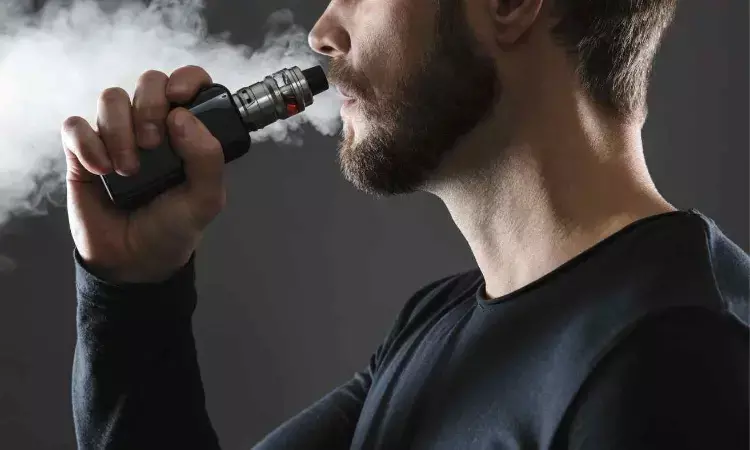- Home
- Medical news & Guidelines
- Anesthesiology
- Cardiology and CTVS
- Critical Care
- Dentistry
- Dermatology
- Diabetes and Endocrinology
- ENT
- Gastroenterology
- Medicine
- Nephrology
- Neurology
- Obstretics-Gynaecology
- Oncology
- Ophthalmology
- Orthopaedics
- Pediatrics-Neonatology
- Psychiatry
- Pulmonology
- Radiology
- Surgery
- Urology
- Laboratory Medicine
- Diet
- Nursing
- Paramedical
- Physiotherapy
- Health news
- Fact Check
- Bone Health Fact Check
- Brain Health Fact Check
- Cancer Related Fact Check
- Child Care Fact Check
- Dental and oral health fact check
- Diabetes and metabolic health fact check
- Diet and Nutrition Fact Check
- Eye and ENT Care Fact Check
- Fitness fact check
- Gut health fact check
- Heart health fact check
- Kidney health fact check
- Medical education fact check
- Men's health fact check
- Respiratory fact check
- Skin and hair care fact check
- Vaccine and Immunization fact check
- Women's health fact check
- AYUSH
- State News
- Andaman and Nicobar Islands
- Andhra Pradesh
- Arunachal Pradesh
- Assam
- Bihar
- Chandigarh
- Chattisgarh
- Dadra and Nagar Haveli
- Daman and Diu
- Delhi
- Goa
- Gujarat
- Haryana
- Himachal Pradesh
- Jammu & Kashmir
- Jharkhand
- Karnataka
- Kerala
- Ladakh
- Lakshadweep
- Madhya Pradesh
- Maharashtra
- Manipur
- Meghalaya
- Mizoram
- Nagaland
- Odisha
- Puducherry
- Punjab
- Rajasthan
- Sikkim
- Tamil Nadu
- Telangana
- Tripura
- Uttar Pradesh
- Uttrakhand
- West Bengal
- Medical Education
- Industry
Vapes more effective for smoking cessation than nicotine gum and lozenges: Study

A randomized controlled trial (RCT) evaluated whether vaporized nicotine products (VNPs) are more effective than nicotine replacement therapies (NRT) for smoking cessation among people experiencing social disadvantage. The researchers found that VNPs were more effective than NRT for smoking cessation in a low socioeconomic status (low-SES) population. As this population is disproportionately affected by the harms of smoking, VNPs may have a critical role in promoting smoking abstinence. The study is published in Annals of Internal Medicine.
Researchers from the National Drug and Alcohol Research Centre (NDARC), UNSW Sydney, AU and colleagues conducted a two-group, open-label RCT of 1,045 low-SES participants in New South Wales, AU between March 30, 2021 and December 8, 2022. Eligible participants smoked daily, were aged 18 years and over, were willing to make a quit attempt within two weeks of screening and were receiving a government pension or allowance (indicator of low-SES).
They were randomly assigned to the VNP or NRT group in a 1:1 ratio. The NRT group had the choice of receiving 8 weeks’ supply of either nicotine gum or lozenges, and the VNP group received 8 weeks’ supply of nicotine e-liquid to use in either a tank device or a pod device. VNP participants could receive the e-liquid in tobacco, menthol, and fruit flavors. All participants received behavioral support via automated text messages for five weeks.
The primary outcome was six-month continuous abstinence from smoking. The researchers found that the six-month continuous abstinence was 9.6% in the NRT group and 28.4% in the VNP group. Subgroup analyses of age, sex, nicotine dependence and mental illness also found that VNP was more effective than NRT. The results suggest VNPs may have a role in promoting smoking abstinence among groups experiencing socioeconomic disadvantage, as well as the general population.
Reference:
Ryan J. Courtney, Bridget C. Howard, Daniel Barker, et al. Vaporized Nicotine Products for Smoking Cessation Among People Experiencing Social Disadvantage: A Randomized Clinical Trial. Ann Intern Med. [Epub 15 July 2025]. doi:10.7326/ANNALS-24-03531
Dr Kamal Kant Kohli-MBBS, DTCD- a chest specialist with more than 30 years of practice and a flair for writing clinical articles, Dr Kamal Kant Kohli joined Medical Dialogues as a Chief Editor of Medical News. Besides writing articles, as an editor, he proofreads and verifies all the medical content published on Medical Dialogues including those coming from journals, studies,medical conferences,guidelines etc. Email: drkohli@medicaldialogues.in. Contact no. 011-43720751


